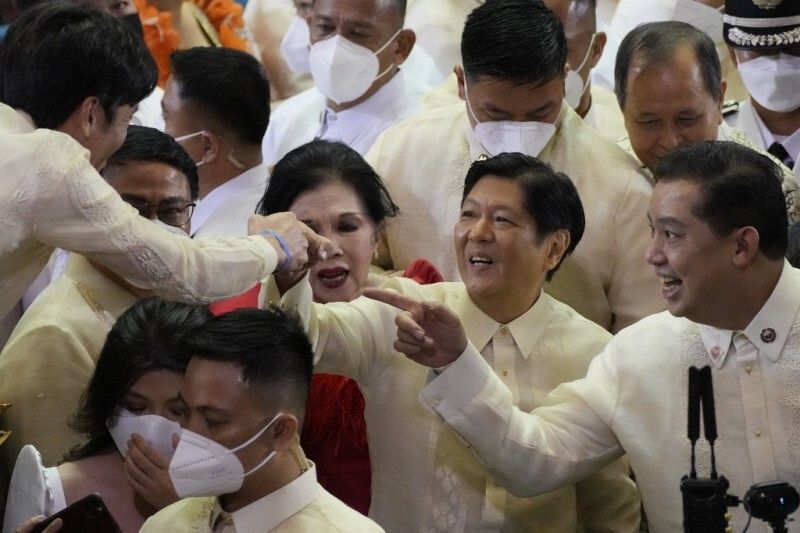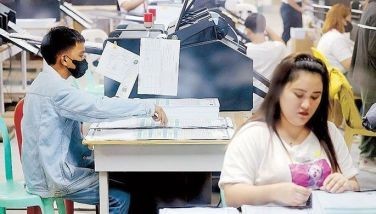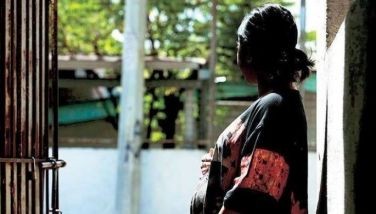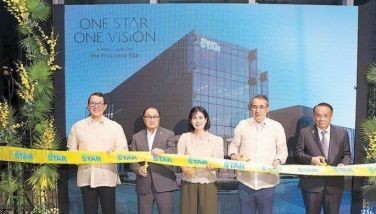What Marcos said in his first SONA, from A-Z

MANILA, Philippines — President Ferdinand Marcos Jr.’s first State of the Nation started on time, flowed without departure from script and free from expletives that marked his predecessor's addresses.
But Marcos also presented himself as a leader who will continue at least some of the programs and policies of former president Rodrigo Duterte.
Here, we break down the one-hour speech into easily digestible topics from A to Z.
Agriculture
One of the first things Marcos addressed during his SONA was agriculture, which he envisioned as “one of the main drivers of our push for growth and employment.”
The president, who currently holds the Department of Agriculture portfolio, has big plans for the sector that he acknowledged cannot be done in even a year “but has to be started now.”
Among these plans are to increase agriculture production in the next planting season by giving farmers financial and technical assistance. Marcos plans to sustain this in the long term by investing in scientific research and modernization in the sector.
Ayuda
Marcos gave marching orders to the Department of Social Welfare and Development to continue cleaning up the list of beneficiaries of the government’s conditional cash transfer program called Pantawid Pamilyang Pilipino Program or more popularly known as 4Ps.
He also vowed to strengthen the existing Assistance to Individuals in Crisis Situations program.
Build better more
Marcos being a continuity president is best seen in his promises on infrastructure as he vowed to “not only continue, but wherever possible... expand” the ambitious Build, Build, Build program of his predecessor Duterte.
“We must keep the momentum and aspire to build better more,” Marcos said. “I will not suspend any of the ongoing projects as those have already been shown to be of benefit to the public that they serve. I will continue to study the proposals that have been made.”
The president said his administration will sustain infrastructure spending at 5% to 6% of the country’s gross domestic product and will tap the private sector for partnerships to expand projects.
Cash-based budgeting
Yet another mark of the Duterte administration that Marcos would want to carry over to his is cash-based budgeting, where public funds can only be used within the fiscal year and whatever is left has to be returned to the treasury.
The president is asking Congress to pass a budget modernization bill “to strengthen fiscal discipline in the allocation and use of budget resources by ensuring that every peso budgeted by the government would lead to the actual delivery of programs and projects.”
The Duterte administration attempted to insert this in the 2019 budget, but Congress rejected it despite being composed largely of allies of the then president.
Creative industry
Marcos vowed to protect workers in the creative industry — one of the hardest hit by the pandemic — although details on this are scant.
“We require an institutionalized creative industry that will advance the interests of its stakeholders. They give soul and identity to our being Filipino. Let us protect them,” he said.
Debt condonation
The president is asking Congress to pass a law that would condone the debts of agrarian reform beneficiaries.
“The condonation of the existing agrarian reform loan will cover the amount of 58.125 billion pesos benefiting around 654,000 agrarian reform beneficiaries and involving a total of 1.18 million hectares of awarded lands,” Marcos said.
Defense
Marcos is also asking Congress to amend the National Defense Act of 1935, which he called “antiquated,” to “provide for a change in the military structure of the Armed Forces of the Philippines that is more responsive to current and future non-conventional security threats to the country’s territorial integrity and national sovereignty.”
Digitalization
Marcos, who is aiming for an "agile bureaucracy," is pushing for government records and archives to be digitized, harmonized and shared across departments and agencies.
Disability pension
Also among Marcos’ wish list for Congress is the passage of a law that grants a monthly disability pension instead of disability benefits for military and uniformed personnel who retired by reasons of disability.
Economic targets
Marcos started his SONA by discussing the state of the economy and his vision for it. He laid down the following figures as economic targets during his term:
- 6.5 to 7.5% real GDP growth in 2022; 6.5 to 8% real GDP growth annually between 2023 to 2028
- 9% or single-digit poverty rate by 2028
- 3% National Government deficit to GDP ratio by 2028
- Less than 60% National Government debt-to-GDP ratio by 2025
- At least 4,256 US$ income per capita and the attainment of upper middle-income status by 2024
To fix the government's pandemic-battered balance sheet, Marcos said his administration will impose taxes on digital sales and improve tax compliance procedures to improve revenue collections and cut debt.
He reiterated the plans unveiled by his economic team earlier this month. So far, no new details on his fiscal management plan.
Our story on Marcos' economic targets: Marcos' economic team sells 'ambitious' goals as Philippines faces tougher 2022
Energy sources
In an effort to tackle climate change and dwindling power supply, Marcos said there is a need for the country to explore other energy sources, particularly renewable and nuclear energy and natural gas.
English skills
Marcos said the medium of instruction in schools must be re-examined to consider English as a medium of instruction, given that “the language of the Internet” which the president said is now a “global marketplace,” is English.
“The question of our medium of instruction must be continuously re-examined to maintain that advantage that we have established as an English-speaking people,” he said.
READ: Marcos reveals ideal education system: English-speaking students good at science and math
Filipino advocacy group Tanggol Wika on June 21 opposed the president’s plan to use English as the primary medium of instruction in basic education, calling the policy “illogical.”
“Other than insufficient funds for public education, the government’s perennial obsession with the forced use of English in education is to blame for the current mess we are in,” the group said.
Face-to-face classes
The Philippines remains one of the few countries where in-person classes have yet to resume at full capacity, but Marcos seeks to change that.
“I believe it is time for our children to return to full face-to-face classes once again,” he said.
The president said there is a need to ensure that classrooms are safe for the entire school community and that there must be an increase in the intake of booster shots.
Inflation
As expected by many Filipinos, Marcos touched on inflation in his speech, acknowledging that it “has accelerated in recent months due largely to significant increases in international prices of oil and other key commodities.”
He mentioned projections for inflation, which he said has been adjusted upward, but did not lay down concrete plans to tame rising prices aside from his vow to increase agricultural output.
K-to-12 review
Marcos said his administration is “giving a careful review” of the K-to-12 system which was first implemented under the administration of the late President Benigno Aquino III.
“There have also been lengthy discussions on the continuation and viability of the K to 12 school system. We are giving this a careful review, and all necessary inputs and points of view are now being considered,” Marcos said.
Land distribution
Marcos said his administration will be distributing 52,000 hectares of unused agricultural lands to landless war veterans, surviving spouses and orphans of war veterans, and army and police retirees.
He also said that agricultural lands that the government has acquired will be given to landless agriculture graduates, stressing that there is a need for “fresh and new blood” in the agricultural sector.
Marcos Sr. legacy
As expected, Marcos harped on some of his family’s legacy during his SONA including “Kadiwa” rolling stores and specialty hospitals like the Heart Center, Lung Center, Children’s Hospital and the National Kidney and Transplant Institute.
The president, however, did not make mention of his father’s brutal martial rule that oversaw thousands of human rights violations.
Still, the president got a standing ovation when he vowed to put up specialty hospitals in the regions as well.
National Land Use Act
Marcos is asking Congress to pass the National Land Use Act, which was put forward by the Duterte administration, to provide for a “rational and holistic management and development of [the] country's land and water resources.”
Netflix
It appears that Marcos has no chill when it comes to imposing new taxes as he put forward another Duterte-era measure that might turn off Filipinos and prompt them to turn off the TV as he is pitching to Congress to pass a new law that would impose a value-added tax on digital services like Netflix.
He projects that the initial revenue impact of this measure will be around P11.7 billion in 2023 alone.
OFWs
Marcos has a grand plan for overseas Filipino workers, one of the sectors that heavily supported his presidential bid: To shorten their hiring process and make their lives generally easier.
“From three months, we will turn this into just three weeks for a foreign employer to process a Filipino’s papers who they want to hire,” he said. “Life is hard, that is why we do not want to see our migrant workers go through any further hardships just to fulfill their dreams.”
Quality education
“The ‘horror’ stories that we have heard about the poor quality of educational materials and supplies that are being given to our schools — this must end!” Marcos said.
The president is also pushing for the country’s educational system to do better in international ranking, especially in science, technology, engineering and mathematics.
“These skills and this knowledge are necessary for our young people to be able to compete in a highly technological and competitive world,” he said.
Railways
Marcos said it is clear to him that railways “offer great potential as it continues to be the cheapest way of transporting goods and passengers.”
As such, he said his administration is committed to finish the following railway projects:
- North-South Commuter Railway
- Metro Manila Subway Project
- LRT-1 Cavite Extension
- MRT-7
- Common station connecting LRT-1, MRT-3 and MRT-7
Marcos also has his eyes on railway systems outside of Metro Manila including the Mindanao Railway Project, the Panay Railway Project and the Cebu railway system.
Although commuters and mobility groups pointed out his plans lacked short-term and more urgent solutions to the transportation crisis such as providing sidewalks, bike lanes and overhauling the public transportation system.
ROTC
Marcos is pushing Congress to reinstate the mandatory participation of students in the Reserve Officers Training Corps, which was abolished after the killing of University of Santo Tomas cadet Mark Welson Chua.
While not acknowledging this brutal past of ROTC, Marcos said the program will “motivate, train, organize and mobilize the students for national defense preparedness, including disaster preparedness and capacity building for risk-related situations.”
Vice President Sara Duterte, concurrently education chief, earlier said she wants mandatory military service for adult Filipinos and said they would "be given a subsidy you will be asked to serve our country in our Armed Forces of the Philippines."
READ: If she wins as VP, Sara Duterte to push for mandatory military service for adult Filipinos
Sovereignty
“I will not preside over any process that will abandon even a square inch of territory of the Republic of the Philippines to any foreign power,” Marcos said, which was met with thunderous applause.
Again, Marcos demonstrates that he is a continuation of Duterte in foreign policy, reiterating key points of his predecessor’s approach to dealing with diplomacy.
“With respect to our place in the community of nations, the Philippines shall continue to be a friend to all and an enemy to none,” Marcos said. “If we agree, we will cooperate and we will work together. If we differ, let us talk some more until we develop consensus.”
Tax reform
Marcos is asking Congress to pass two tax packages, namely the valuation reform bill and the Passive Income and Financial Intermediary Taxation Act.
The first measure provides for the establishment of real property values and valuation standards across the country and development of Real Property Information System that provides for the database of all real property transactions and declarations in the country.
Meanwhile, PIFITA seeks to reform the taxation of capital income and financial services by redesigning the financial sector taxation into simpler, fairer, more efficient and a revenue neutral tax system.
Vaccine institute and other pandemic era proposals
Marcos is carrying over some pandemic-era proposals that the Duterte administration pitched to Congress in its last years, namely the creation of a vaccine institute, a virology institute, the Philippine Center for Disease Prevention and Control and the establishment of a medical reserve corps.
Women’s rights
Marcos said he will strengthen the implementation of Violence against Women and their Children.
In partnership with local government units, the president said the government will provide counseling for victims.
Zero lockdowns
The Philippines would not be able to handle another lockdown, Marcos said, and he would no longer impose one.
“We need to properly balance health and the welfare of our countrymen on one hand, and the economy on the other hand,” he said in Filipino. — with reports from Kristine Joy Patag
- Latest
- Trending

































